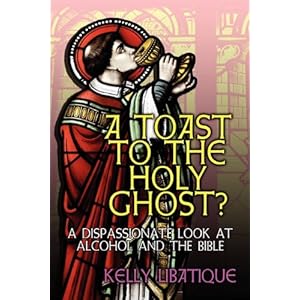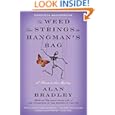*** A History of the World in Six Glasses, Tom Standage, 2005
 I think I got this book on the Kindle Daily Deal. (If you have a Kindle, you should check it every day.)
I think I got this book on the Kindle Daily Deal. (If you have a Kindle, you should check it every day.)
Standage's theme is that you can track the ages through the successive prominence of six beverages: beer, wine, liquor, coffee, tea, and cola. He makes a compelling case. In fact, he shows that in many cases, the drinks themselves shaped history, and in the case of tea, a corporation wielded the power of government over a large portion of the glob and instigated the tax that fomented a revolution.
It's a fascinating read. I'm going to leave you with this rather lengthy quote from the end of the book about the original and possibly next global drink.
As much as 40 percent of the bottled water sold in the United States is, in fact, derived from tap water, though it is usually filtered and may have extra minerals added. America's two leading bottled-water brands, Aquafini and Dasani, are derived from municipal water supplies. And although many bottled-ater labels depict glaciers, crystal streams and ice-covered mountains, tjhese images do not always reflect the true origins of the water within. A study buy the National Resources Defense council, an American environmental lobbly group, found that one brand of bottled water, labeled as "pure glacier water," came from a municipal water supply. Another brand, claiming to be "spring water," with a label showing a lake and mountains, actually came from a well in a factory parking lot, near a hazardous wasted dump. The study also noted that in both Europe and the United States, the quality of tap water is far more stringently controlled than the quality of bottled water.
There is no evidence that bottled water is any safer or healthier than the tap water available in developed nations, and in blind tasting tests, most people cannot tell the difference between the two. The differences in taste between bottled waters exceed the difference in taste between bottled water and tap water. Yet people continue to buy bottled water, even though it costs between 250 and 10,000 times as much per gallon as tap water. In short, safe water has become so abundant in the developed world that people can afford to shun the tap water under their noses and drink bottled water instead. In contrast, for many people i nthe developing world, acess to water remains a matter of life or death.
EBOOK FORMATTING ***
Why it matters.
Full navigation, including TOC.
Proper chapter and paragraph formatting. However, problems with hypenated words were littered liberally throughout the book, manifesting as words being hyphenated even if they don't break between lines, such as "Attend-dants." Sometimes there would be a space instead of a hypen, which was even more confusing.
Proofreading. I only found a few typos, for example "guesrs" instead of "guests."
Overall, a decent job of ebook production, but it does illustrate my claim that ebooks are not proofread as closely as print books. I guarantee you no print book would leave a publisher with dozens of words with hypens or spaces in the middle of them.
I read this book back in the 70s and loved it. Since it's been a while I thought I'd give it another read. Still good.
 This one of two books in the list that was published before my 1996 essay. However, in a time before Amazon.com, books published by a small press in the UK were not readily available to geeks in
This one of two books in the list that was published before my 1996 essay. However, in a time before Amazon.com, books published by a small press in the UK were not readily available to geeks in  I think I got this book on the
I think I got this book on the  I grabbed this one on Kindle after noticing some (possibly coincidental) similarities in the description and my 1996 essay on the topic. I read through it in a night and found it worthy in places, but laden with specious reasoning in others. For example, consider this passage:
I grabbed this one on Kindle after noticing some (possibly coincidental) similarities in the description and my 1996 essay on the topic. I read through it in a night and found it worthy in places, but laden with specious reasoning in others. For example, consider this passage: I bought this a few months ago but have been saving it as a treat to myself. I picked it up during the week between Christmas and New Year and forced myself to only read a little at a time so it would last the whole week. I finished it on Dec 30, so I was almost successful.
I bought this a few months ago but have been saving it as a treat to myself. I picked it up during the week between Christmas and New Year and forced myself to only read a little at a time so it would last the whole week. I finished it on Dec 30, so I was almost successful. This is an exhaustive study of the subject from multiple viewpoints, delving down into the Hebrew, Greek and Latin with hundreds of footnotes, written by a Seventh-day Aventist theologian in his sixties. This book was a clear indication to me how just how superficial my analysis was. It is also a highly soporific approach and I am certain that the casual inquirer into the subject will never get past the 3 prefaces, the 8-page introduction (legal pages) and the 9-page second introduction. Chapter 1 shows up at page 28
This is an exhaustive study of the subject from multiple viewpoints, delving down into the Hebrew, Greek and Latin with hundreds of footnotes, written by a Seventh-day Aventist theologian in his sixties. This book was a clear indication to me how just how superficial my analysis was. It is also a highly soporific approach and I am certain that the casual inquirer into the subject will never get past the 3 prefaces, the 8-page introduction (legal pages) and the 9-page second introduction. Chapter 1 shows up at page 28 The current paster in Fred, Texas
The current paster in Fred, Texas  A 1952 speech by Noah S. "Soggy" Sweat, Jr., a young lawmaker from Mississippi, on the subject of whether Mississippi should continue to prohibit (which it did until 1966) or finally legalize alcoholic beverages:
A 1952 speech by Noah S. "Soggy" Sweat, Jr., a young lawmaker from Mississippi, on the subject of whether Mississippi should continue to prohibit (which it did until 1966) or finally legalize alcoholic beverages:
